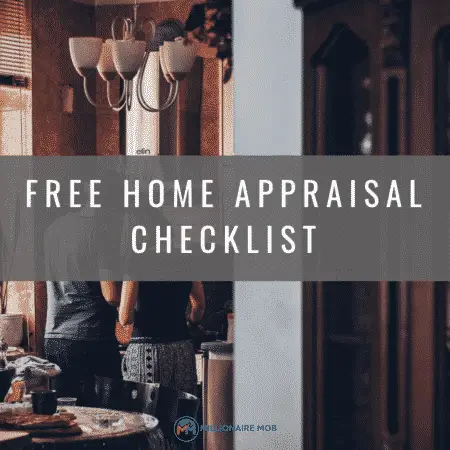Here is a home appraisal checklist to ensure you the right value for your real estate.
Home Appraisal Checklist: How to Ensure You Get the Right Value
If you’re a homeowner, a home buyer or a seller, you may at some point require the services of a home appraiser. Building wealth through real estate is a sound strategy. It is one of my favorite ways to build wealth effectively.
I owe a lot of my net worth increase from real estate. I will continue to invest in real estate to increase my income and net worth simultaneously. Giving you the tips to build wealth is one of the many reasons why I started Millionaire Mob.
When you want to refinance an existing mortgage, apply for a home equity loan or sell your home, you need to ensure that you get the right value. A home appraisal checklist can come in handy in such situations.
The home appraisal process can be quite a daunting task. You need to understand the process before you make an offer on any property since your ability to get a mortgage largely depends on it. You may end up not getting the mortgage refinancing if the value is too low.
A home appraisal gives your mortgage lender a guarantee that the collateral on your loan is worth enough to secure that loan. After purchasing my second home, I’ve been using Airbnb to minimize my mortgage cost on a monthly basis.
Here is another resource that has several good posts on how to save money.
Before we explore the home appraisal checklist, let’s first define what a home appraisal means.
A home appraisal is a comprehensive evaluation of a property’s value by a qualified and authorized expert. If you would like to know how much your home can cost in the current market, a licensed appraiser can give you an exact estimate of your home current value based on a few factors like the latest home sale in the neighborhood.
Here are some tips for you to consider in the home buying process.
Home Appraisal Checklist for a Seller or a Homeowner
There are a couple of things you can do to prepare your house for a sale process and help your appraiser. Before you start, the process you must be aware of a realistic sales price and ensure your home is suitable for a wide range of potential buyers. If you’re a home seller or homeowner, here are a few steps to take to prepare for your home appraisal:
- Do Your Research
You can do an in-depth analysis of your home value by finding out what was the cost in a recent home sale near your home. If you have the information, it will give you an idea of the value of similar homes in your area. The market associated with your home is only a small portion of the risks associated with real estate. Here are several other real estate risks to consider.
- Prepare Your Home
If you decide to get your home appraised, you need to declutter and spruce up your home before the big day. It helps to make an outstanding first impression. Let’s get into a few suggestions on how to prepare your house for a home appraisal.
Tips to Increase Your Prepare Your Home for an Appraisal
To increase the value of your home, you need to do a few things to improve appearance. Think of your house as a product that you need to market. You want to improve everything as much as possible. Think of every detail that will help increase your chances of selling your property.
Here are a few helpful tips that may help to raise your home’s appraised value:
Improve Your Home’s Exterior
Since the exterior is the first thing everyone sets their eyes on, try to keep it as appealing as possible. Mow your lawn, trim the shrubs, and do a bit of gardening if possible. Clear your driveway and improve your curb appeal. If a home has a beautiful exterior, it usually gets a better appraisal value.
This will ultimately lead to a better cap rate on the sale (if bought by an investor). Here’s how to calculate a cap rate for your income property.
Work on Your Interior Decor
To make your home more appealing, consider repainting your walls especially if they are multicolored or not in good shape. Consider painting neutral colors, such as white or beige, since they make the house seem more spacious. Don’t remodel your home as it is usually a poor investment if your home is intact.
Make a Few Minor Repairs
If there are any broken doors, windows, chipped paint, damaged tiles or loose shingles, take care of it. Switch out leaky bathroom faucets with shiny current versions. Make minor repairs and maintenance since any malfunctions or damaged items could reduce the home value.
Evaluate if a big repair is needed because that can blow up a real estate transaction. Big repairs include things like a roof replacement.
Clean Up the Home
Vacuum and dust the shelves, and do a deep cleaning of appliances and other pieces of equipment. If you clean your home and maintain your kitchen, it may create a better impact on your appraiser.
- Don’t Influence the Appraiser
Don’t push your appraiser to make a false estimate like inflating your home value. It is unethical and illegal. Homeowners and lenders can report inaccurate evaluations to the office of real estate appraisers. You can help by pointing out what makes your home great but don’t nag. Your home appraisers’ checklist should not be altered with by anyone.
- Document the Changes You’ve Made
Write a comprehensive list of all the improvements you have ever made to your home for as far back as possible. Give the file to your appraiser as evidence of the maintenance and improvements you’ve made since it may help increase your home’s value.
- Choose the Appraiser
In the instances where you want to refinance or apply for a home equity loan, the lender chooses the appraiser typically. However, if it is your choice, you need to do extensive research to get all the potential certified appraisers.
Talk to your neighbors, family, and friends for referrals. Research the home appraiser’s professional checklist to find out what they usually want. Also, check information about their fees and the time they take to complete the process.
Home Appraisal Checklist for a Buyer
As a buyer, you should do as much as you can to level set your expectations in the home purchasing process. Most of the time the appraiser is selected by the mortgage provider, so you don’t have many options there.
Here is a list of all the things that you will want to know if you’re going to purchase a house:
Recent Home Sale Prices in the Nearby Surroundings
The home appraiser reviews the worth of the most recent home sale near your home. Your chances of a favorable home appraisal value, therefore, depends on the last sale and so you should find out the figures before you even place an offer on your home.
Ensure you discuss this with your realtor beforehand. There are plenty of thing real estate agent secrets you might not hear from your realtor.
Your Desired Home’s Condition
The condition of the house also helps determine the final price. Determine out the shape of the house you want, and check whether the plumbing and electrical systems are in good condition.
Evaluate if there are any damages, wear-and-tear or loose items that may require to repair.
Evaluate an Appraisal Contingency in the Offer
You may be required to put up good-will money, and if you withdraw the offer to buy the house, you may lose the money. So, your offer to buy a home should point out that, it is contingent on the appraisal reaching the sales price.
So, if the appraisal price is low, you can withdraw the offer without losing your money.
Consider Both the Property’s Positives and Negatives
You may be attracted to the square footage and lot dimensions, but you also need to check if the home will expose you to any potential health hazards and risks such as lead paint, external factors like noise and if it has any structural issues.
If the house is older, you may want to consider negotiating in a home warranty plan in the purchase.
How Much a House Needs to Appraise for You to Gain Approval for a Mortgage
Since most lenders determine their risk on loan to value ratio, you should ensure that the assessed value is at least more than the total buying price. So, even if you pay a down payment, don’t just consider the amount of the mortgage.
The reason is, if a house value is at a lower price than the purchase price, then you’ll have to pay more as down payment.
Why You May Fail to Get a Mortgage Loan on Your Appraised Property
In some instances, you may not get a mortgage loan due to a low appraisal value. Your mortgage loan depends on the appraisal value, and so if it is too little, you may not be able to acquire a mortgage.
In such circumstances, any property appraisal checklist will help you find out if you’ve followed the procedure and appeal or request for another appraisal if you’re not satisfied with the report.
In certain areas, the market value can go up due to forces of supply and demand. However, due to other factors such as low recent home sale value in the neighborhood, the appraisal may be lower.
Conclusion on Home Appraisal Checklist
A home appraisal checklist is an essential tool for a buyer, a seller, and a homeowner since it offers ultimate guidelines of what you require in the home buying or selling process as well as when applying for a mortgage. My goal is to live completely mortgage free, but the only way you can have a mortgage is if you buy a house!
I cannot stress the importance of staying prepared during your home sales or purchase process.
You should begin the preparation process weeks or months before you actually start showing houses. This is the only way to ensure an optimal outcome.
Subscribe to the Millionaire Mob early retirement blog newsletter to find the best travel hacking tips, dividend growth investing, passive income ideas and more. Achieve the financially free lifestyle you’ve always wanted.
Join our community of over 3,000 mobsters seeking financial freedom. What are you waiting for?







1 Comment
This is some really good information about home appraisals. It is good to know that it would be smart to do your research on a house before thinking about purchasing it. I liked that you explained that it might be smart to get some good reports on the house. Personally, I would know if the home will increase or lose value over time.